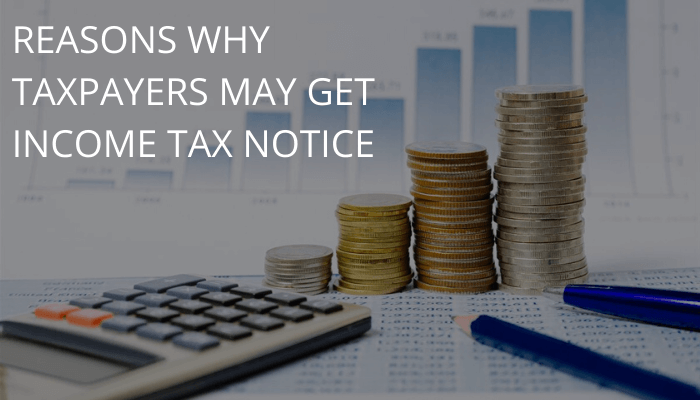After filing the Income Tax returns by the assessee, the Income Tax department processes the return and verifies the correctness of the same and issues Income tax notices if necessary. The Taxpayers need to study and analyze the income tax notices and should take the needful action within the stipulated time provided. In this article, we will discuss such situations or reasons which lead to raise income tax notices.

Following are the few major reasons because of why taxpayers may get Income Tax Notice
- Defective Return
- Failure to file Return
- Mismatch with Form- 26AS
- Hiding Income/ Not Disclosing Income
- High-Value Transaction
- Scrutiny
- Adjusting Refund due against the Outstanding Tax Payable
- Escaping Income from Assessment
Defective Return
The Assessee may get a defective return notice u/s 139(9) of Income Tax act if his return has not accompanied by the documents, which are defined in this section. For Example, the Person files his income tax return in an incorrect form. The assessee is required to rectify such defects within a period of 15 days or such a further extended period from the date of the notice.
Failure to file Return
The Assessee may get a notice u/s 142(1) of the income tax act if he has not filed his return of income. Although, if the person fails to file the return up to the end of the due date, then also he can file the return up to the end of the assessment year with fine and interest. However, notice under section 142(1) can be issued even after the end of the assessment year which requires you to file the return within such time as specified in the notice.
Note: If the assessee has not filed his ITR till the end of the relevant assessment year, then he can request his assessing officer to send him the notice 142(1), because now, this is the only option under which the assessee can file his return even after the end of the assessment year.
Intimation under section 143(1),
The Assessee may get a notice u/s 143(1) of the income tax act if there are any discrepancies between TDS claimed in the return of Income and TDS recorded in Form 26AS or Form 16. The Assessee may also get a notice under this section if there are any arithmetical mistakes, the incorrect claims of deductions or expenditures. Although, practically intimation under section 143(1) is issued in every case. So, if you have received such intimation then there is no need to panic. Just take the assistance of a Chartered Accountant.
Also, From the finance Act, 2018, if you are claiming different amounts in return as a comparison to TDS in form 26AS or Form 16, then it would not become the reason for receiving form 143(1).
Hiding Income/ Not Disclosing Income
Income Tax department gets information about the assessee from different sources such as banks, employers, etc.., to ensure that all income which is chargeable to tax has to be taxed. In case of Not disclosing such income, the Income Tax department will issue a notice u/s 139(9) or 143(1) or 148 of Income Tax act.
High-Value Transactions
The Assessee may get a notice u/s 143(2) of income tax within 6 months from the end of the financial year in which the return is filed if he has done a high-value transaction in any financial year. Following transactions can be regarded as High-value transactions
- Cash Deposits in a bank of Rs.10lakhs or more
- Credit card payments of Rs.2 lakhs or more
- Mutual Funds Investments of Rs.2 lakhs or more
- Making Investments in bonds or debentures in a company of Rs.5 lakhs or more
- Investments in company shares of Rs.1 lakh or more
- Jewelry purchases for Rs. 2 lakhs or more
Scrutiny
Income tax department issues scrutiny Notices u/s 143(2) by randomly selecting the returns based on certain criteria to ensure that assessee
has not understated the income or
has not computed excessive loss or
has not underpaid the taxes in any manner.
Adjusting Refund due against the Outstanding Tax Payable
The assessee may get notice u/s 245 of the Income Tax act, as an intimation for setting off the outstanding tax payables of earlier assessment year or years against the refund due to the assessee. The assessee has to respond to the notice within the period of 30 days from the date of issue of notice, otherwise, the assessing officer will proceed further.
Escaping Income from assessment
The assessee may get notice u/s 148 of income tax if the assessee has escaped his income from assessment. The assessing officer issues notice under this section only when he believes that the assessee has escaped his Income from assessment and has reliable and corroborative evidence for such evasions.

1 thought on “Reasons why Taxpayers may get Income Tax Notice”